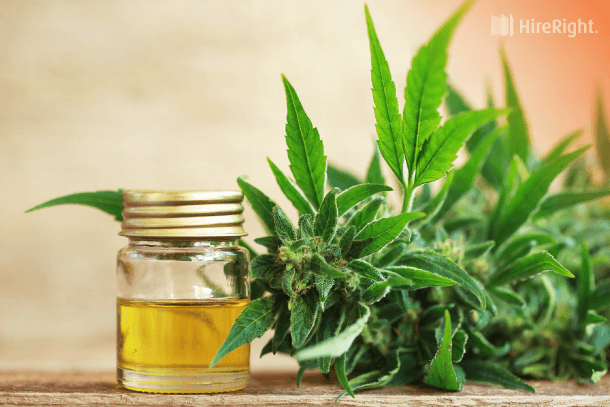Clarifications on CBD and Drug Testing
We cover information employers need to know about Medical Marijuana, CBD, and drug testing.

Medical marijuana has been an issue in the US since the inception of the war on drugs in the 1970s. In 1978, Robert Randall sued the federal government for arresting him for using cannabis to treat his glaucoma. The judge ruled Randall needed cannabis for medical purposes. This medical marijuana standard persisted until 1992 when George H.W. Bush discontinued the program. Since that time there has been an explosion of states that have authorized medical marijuana for “compassionate care.” Currently, there are 31 states and the District of Columbia that have medical marijuana statutes.
Why did I start a CBD blog with a blurb on medical marijuana? Well, cannabidiol (CBD) is a naturally occurring cannabinoid that is found in the hemp family of plants, which includes Cannabis Sativa and Cannabis Indica. The majority of the positive health effects touted by medical marijuana users actually come from the CBD component. For example, the CBD component is anti-epileptic. Studies also show that CBD inhibits inflammatory and neuropathic pain, two of the most difficult types of chronic pain to treat. CBD has shown to be useful in treating anxiety, particularly anxiety-causing sleep dysfunction since CBD helps with both falling asleep and staying asleep.
In June of this year, the US Food and Drug Administration approved Epidiolex (CBD oral solution) for the treatment of rare childhood seizure disorders. The Drug Enforcement Agency followed suit and removed CBD from the Schedule 1 list. Schedule 1 drugs include Heroin (diacetylmorphine, LSD (lysergic acid diethylamide), Marijuana (cannabis, THC), Mescaline (peyote), and MDMA (3, 4-methylenedioxymethamphetamine or ecstasy) which are illegal to prescribe, possess, or use. Currently, Epidiolex is a DEA Schedule 5 drug since CBD does not cause intoxication or euphoria. It is the THC that is the primary psychoactive component of marijuana. When thinking of Schedule 5 drugs, think about low-dose narcotic cough syrups.
CBD and Drug Testing
Epidiolex is an ultrapure extract of the Cannabis Sativa plant. The Epidiolex extraction process essentially eliminates all of the THC components from the solution. If a drug screening donor is using Epidiolex, that donor will not test positive for marijuana. The reason for this is that all drug testing looks for THC or a unique metabolite of THC. CBD is not THC.
Many of the CBD products available are not manufactured according to FDA standards as Epidiolex is. Extracts of CBD from marijuana plants in many cases are massively contaminated with THC since these manufacturers are not FDA approved. Further plant extracts with THC in them beyond FDA-approved levels remain Schedule 1 drug under the Controlled Substances Act. In drug testing use of these contaminated CBD oils is no different than admitting to smoking/ingesting marijuana. From a medical review perspective, CDB oil is not a medical explanation for a positive THC drug test.
Best Practice Recommendations
Let the buyer beware – CBD as medication has the majority of the therapeutic actions associated with medical marijuana (particularly for seizure control and chronic pain). However, many of the state dispensaries as well as online retailers of this product are not FDA approved and do not follow the process to remove THC to a degree that will not affect a drug test. If you work for an organization that has a drug-free workplace program, I strongly encourage you to obtain your recommended CBD product from an FDA-approved manufacturer. Remember, the allegation of CBD use is not a reasonable medical explanation for a positive THC drug test result and it will be up to the employer to assess that positive result.
Unless specifically permitted by law, employers should not consider CBD products used as a valid, reasonable medical explanation for a positive marijuana drug test result as delineated in the above paragraphs.
Employers in states with medical marijuana statutes need to address those positive drug tests for THC (marijuana) in a way that is supported by their drug-free workplace program as well as the underlying state statute despite the donor’s CBD use allegation. CBD products sold in these states may not adhere to FDA manufacturing standards. CBD in these instances is just another form of medical marijuana that from an employment law perspective falls under those state rules.
Find free resources to help your company develop its marijuana policy at our Resource Library.
For Applicants looking for more information about the status of their background check or need customer service, click here.
Looking for more information about our background check services, please contact us today!
Release Date: January 17, 2019

Dr. Todd Simo
Dr. Todd Simo currently serves as the Chief Medical Officer and Managing Director of Transportation at HireRight. He came to HireRight with a decade of experience in the medical consulting arena. Prior to HireRight, he was the Medical Director of an occupational health clinic in Virginia and owned a consulting firm providing medical director service to multiple companies located throughout the country. In that capacity, he established multiple customer specific health and drug screening services. In his current position, he oversees HireRight's medical department.